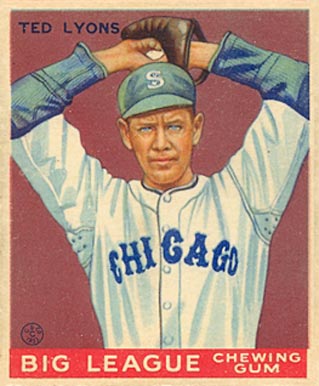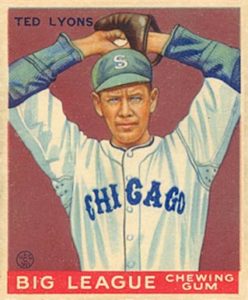Ted Lyons
Vinton native Ted Lyons pitched the most winning games in Chicago White Sox history and earned induction into the National Baseball Hall of Fame.

Courtesy of Wikimedia Commons
Ted Lyons Baseball Card. Goudey Gum Company (Publisher)
Theodore Amar “Ted” Lyons, a Lake Charles native and Vinton resident, toughed out a career with a losing team to win more games than any other pitcher in Chicago White Sox history and earn induction into the National Baseball Hall of Fame. His major league tenure included a no-hitter in 1926 and 260 wins. Lyons became a fan favorite with the White Sox, thanks to his steadiness on the mound, his dedication to a mediocre franchise, and his trademark friendliness and selflessness.
Born in Lake Charles on December 28, 1900, to Asa and Sudie E. Lyons, and raised in nearby Vinton, Lyons starred for Baylor University—so much so that the White Sox snapped him up and brought him to Chicago directly from college. Without spending a day in the minor leagues, Lyons debuted for Chicago in 1923. Over a twenty-one-year career, Lyons endured the mediocrity of the White Sox, which never won a championship during his tenure.
He finished his career with a record of 260 wins and 230 losses, a mark that belied his talent and achievements on the mound. Possibly because of his 230 losses, it took voters eight ballots to finally elect Lyons to the Hall of Fame in 1955. “If he’d pitched for the Yankees,” said Joe McCarthy, longtime manager of the perennial champions, “he’d have won 400.”
Nonetheless, he was a hero in his hometown and his native state. A New Orleans Times-Picayune sports editor once wrote that Lyons “has become as popular a baseball [player] as ever represented the Pelican State.” Like many other baseball stars of the time, Lyons entered military service during World War II. His case was unusual, though, because he was already forty-one years old when he joined the Marine Corps in 1942. Lyons was also well known for his commitment to Vinton and the greater Lake Charles area: he frequently spoke to community groups and school students; took care of his aging sister, Pearl, until her death; and had an easy-going, welcoming nature that spurred him to talk baseball with anyone who approached him. Upon his death on July 25, 1986, at a nursing home in Sulphur, the Vinton News reported that he “gave his all to a profession that he loved, while residents of his hometown followed his accomplishments in awe.” A ballpark in Vinton is named in his honor.
